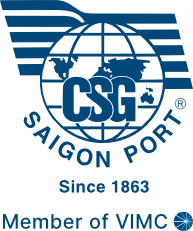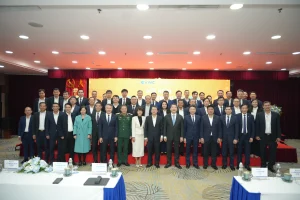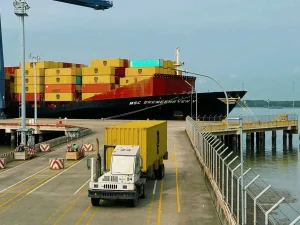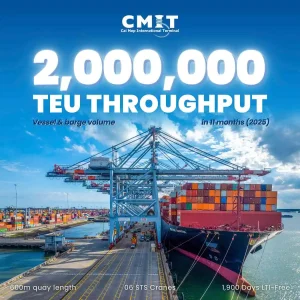Despite the important role of logistics greening in realising the net-zero emissions goal, the work has faced many difficulties, heard a conference held in Ho Chi Minh City on October 15.
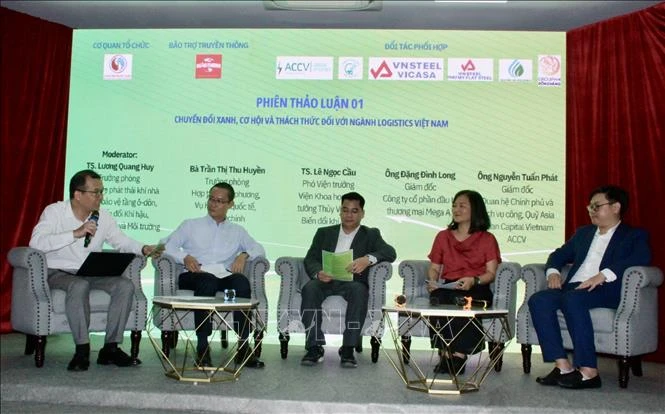
Experts at the conference (Photo: VNA)
HCM City (VNA) – Despite the important role of logistics greening in realising the net-zero emissions goal, the work has faced many difficulties, heard a conference held in Ho Chi Minh City on October 15.
Nguyen Viet Dung, Director of the Centre for Natural Resources and Environment Communication under the Ministry of Natural Resources and Environment (MoNRE) said that green logistics, which refers to logistics activities aiming at sustainable, friendly and environmentally friendly goals, minimising negative impacts on the environment, includes transportation services, material storage and treatment, inventory control, warehousing, packaging and goods allocation locations deciding.
Vietnam currently has more than 40,000 enterprises operating in the logistics sector, making it the leading country among ASEAN members in terms of the number of logistics service providers.
However, Dung noted that in reality, Vietnamese logistics enterprises’ connectivity is poor, especially for enterprises operating in the field of road freight transport. This is a major challenge for green transformation, he held.
Tran Van Toan, Kosher Climate India’s Country Manager for Vietnam, said that more and more countries and regions have required emission reporting for production, transportation and trading of imported goods. In the context of Vietnam having an open economy deeply integrated into global trade, meeting green supply chain standards has become inevitable to avoid being eliminated from the market.
From the beginning of 2024, the European Union Emissions Trading System (EU ETS) have applied carbon emissions inventory from ships with a gross tonnage of over 5,000 tonnes.
The International Maritime Organisation (IMO) 2023 Strategy on Reduction of Greenhouse Gas (GHG) Emissions from Ships aims to reduce carbon emissions from international shipping by at least 40% by 2030 compared to 2008. The IMO is also planning to introduce carbon pricing for maritime transport.
Luong Quang Huy, from the MoNRE’s Climate Change Department said that domestic transport activities account for nearly 50% of GHG emissions in the logistics chain. Therefore, the green transport transition makes an important contribution to the greening of the logistics chain in particular and the goal of reducing greenhouse gas emissions in general, he stated.
However, encouraging people to switch to public transportation means in general and green vehicles in particular is challenging in the context of few attractive options.
For transport service suppliers, mass vehicle conversion requires large financial investments but financial support mechanisms are limited. Therefore, green transport conversion requires creative and innovative policies in operating and implementing more practical models, said Huy.
Bui Van Quy, Executive Vice President of Saigon Newport Corporation and Vice President of the Vietnam Seaports Association said that logistics activities in general, including road transport, maritime transport, aviation transport, and warehouse operations, all emit greenhouse gases. Greening the logistics chain plays an important role in solutions to reduce emissions, he affirmed.
He underlined that the major barrier to the current transformation is the high investment cost for technology. Changing the habits of operators and users of new technology is also very difficult, he said, adding that although the Government’s goals are clear, each industry and field has yet to come up with specific standards and greening roadmaps.
Quy asserted that in order to promote green transition, it is necessary to raise businesses’ awareness of the urgent need of green transition to avoid the situation when their goods and services are refused and expelled from the market.
Dang Dinh Long, Director of Mega A proposed that ministries and sectors develop specific green criteria and standards for each sector to provide a basis for businesses to apply. Businesses also need specialised human resources and special financial mechanisms to serve green transformation, he added./.

